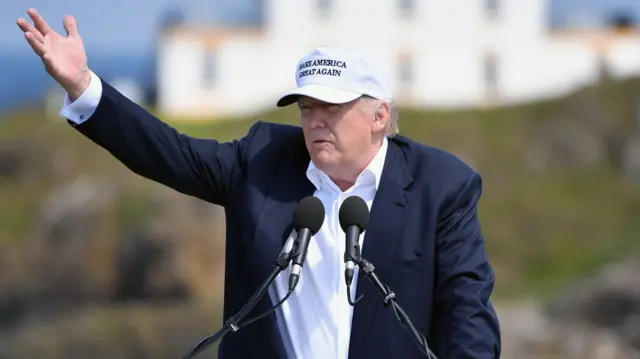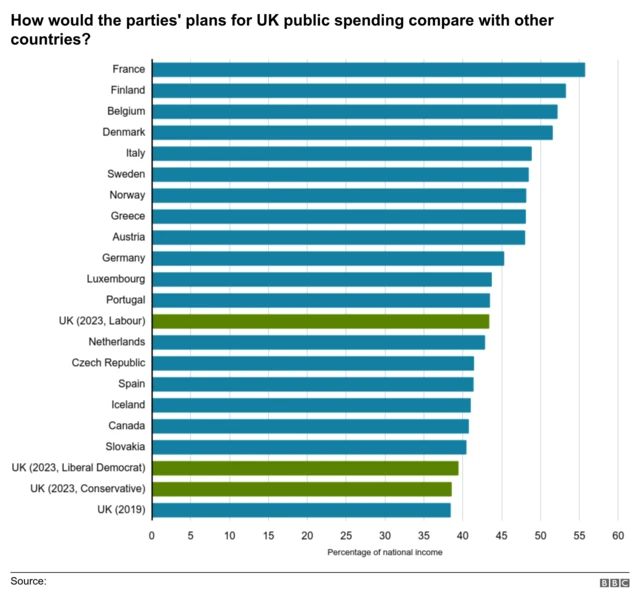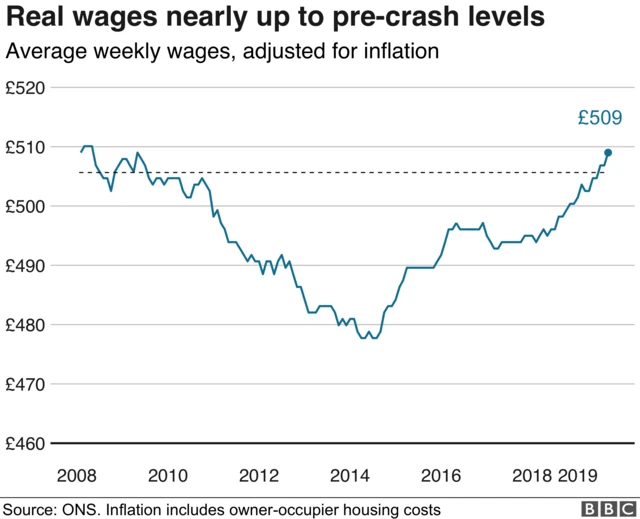Sajid Javid EU trade deal claim fact-checkedpublished at 15:52 GMT 5 December 2019
The Chancellor of the Exchequer told the BBC there was already an agreement in principle.
Read MoreThe Chancellor of the Exchequer told the BBC there was already an agreement in principle.
Read MoreReality Check looks at claims made by the Lib Dem leader in an interview with the BBC's Andrew Neil.
Read MoreLabour says the average UK household has paid an extra £5,949 a year since 2010.
Read MoreThe Russian leader says the US "militarisation" of space means Moscow has to respond.
Read MoreThe EU has criticised the country's "golden passports" scheme that allows wealthy people to buy citizenship.
Read More Reality Check
Reality Check
 Image source, Getty Images
Image source, Getty ImagesDonald Trump speaking at his golf course in Scotland the day after the EU referendum was held
Speaking to reporters in London today, Donald Trump repeated a claim he has made before about Brexit:
“You know that I was a fan of Brexit, I called it the day before. I was opening up Turnberry, the day before Brexit… and they asked me whether or not Brexit would happen and I said yes and everybody smiled and they laughed and I said yes it’s going to happen in my opinion, it was just my opinion.
“And the next day they had the election [sic] and I was right.”
This claim is wrong.
Donald Trump’s visit to cut the ribbon at his golf course in Turnberry in Ayrshire, Scotland was on Friday 24 June 2016, the day after the EU membership referendum was held. The result was announced in the small hours of Friday morning.
He said Brexit was a "fantastic thing" but did not claim to have predicted it on that day.
He did give an interview to Fox News in the US on 22 June, the day before the referendum, giving a mild endorsement to Brexit. "When you look at the things that are going on over there my inclination would be to go it alone."
He admitted however that he knew little about it: “I don't think anybody should listen to me because I haven't really focused on it very much."
And in an interview on 1 June, external, while the referendum campaign was in full swing, the interviewer had to remind him what Brexit actually was.
However, he has claimed to have predicted Brexit before, in June 2018, external.
PM claimed the London Bridge attacker was out of prison because of a Labour law, which he had opposed.
Read More Reality Check
Reality Check
Speaking to ITV's This Morning, Jeremy Corbyn said that Labour's manifesto would put UK public spending at the same level as France and Germany.
This analysis, carried out by the Institute for Fiscal Studies (IFS) think tank, supports Mr Corbyn's claim.
 Image source, Institute for Fiscal Studies
Image source, Institute for Fiscal StudiesAccording to the IFS, Labour's plans would push total spending to a level never previously sustained in the UK in peace time. However, it adds that this level would not be unusual compared with other European countries.
The IFS analysis shows that, by 2023, total public spending under Labour would still be lower than both France and Germany - as a percentage of national income.
But the IFS has questioned whether a large shift in the size of the UK state can be achieved over such a relatively short period of time.
Reality Check has compared the parties' public spending plans, which you can read in full here.
Does election polling deserve its bad reputation?
Read MoreThe facts behind the prime minister's claims on security and the NHS.
Read MoreThe country has a notorious air-safety record - but is it the worst?
Read MoreSenior figures from seven political parties took part in a BBC election debate.
Read More Reality Check
Reality Check
The claim: Rishi Sunak said: "We've decarbonised our economy faster than any other major economy in the world."
The verdict: A parliamentary report earlier this year noted that "the UK has achieved greater decarbonisation than any other country in the G20".
So is Mr Sunak correct? Not entirely.
The source of that claim in the parliamentary report is the Low Carbon Economy Index, external, published by PwC.
It notes that the UK reduced the carbon intensity of its economy - the quantity of greenhouse gases emitted for each unit of economic output - by 3.7% on average between 2000 and 2018.
That's the most impressive record in the G20 group of major nations.
However, it's not just a Conservative achievement. For much of that time, the UK had a Labour government, and between 2010 and 2015, the UK had a coalition government with the Lib Dems running the Energy and Climate Change department.
And in recent years, the UK's performance has not been so outstanding. The decline in carbon intensity in 2017-18 was 3.5%, in ninth place, behind Germany, China, and even Saudi Arabia.
PwC says the UK will have to increase its rate of decarbonisation dramatically, to 9.7%, to achieve its target of net zero emissions by 2050.
 Reality Check
Reality Check
The Brexit Party’s Richard Tice said: “Unlimited immigration in the last 15 years has depressed wages…We had zero real wage growth.”
Last year, the government’s independent adviser on migration, external concluded that migration “is not a major determinate of the wages of UK-born workers”.
It “found some evidence suggesting that lower-skilled workers face a negative impact while higher-skilled workers benefit, however the magnitude of the impacts are generally small.”
The UK has effectively had zero real wage growth since 2007 - but that is because wages fell after the 2008 crash and are only just now catching up.

 Reality Check
Reality Check
Rishi Sunak, Chief Secretary to the Treasury, said: “We've outlined a plan for £34bn, that will go on putting 50,000 more nurses on our wards, 50m more GP appointments and new and upgraded hospitals”
That is the amount of money that will be added to the annual NHS budget by 2023-24, but the cash sum isn’t necessarily the most helpful figure to use.
Because the costs of medicines and equipment and paying staff are rising, the government’s own figures show this will actually be worth less by 2023-24 – about £20.5bn once adjusted for inflation. That's what we call the "real-terms" amount because it's a reflection of how much you can buy with the money by the time it is used.
When it comes to the average percentage increase in health spending – this investment would mean funding going up by 3.4% a year through to 2023-4.
This would be higher than the years from 2010 – under the Conservatives in coalition government with the Liberal Democrats - when it was between 1 and 2%.
But it would be significantly lower than the Labour governments of Tony Blair and Gordon Brown when it averaged 6% a year.
 Reality Check
Reality Check
The claim: Jo Swinson said: "Offshore wind is the cheapest electricity that you can now create, thanks to the Liberal Democrats supporting that technology when we ran the climate change department."
The verdict: Offshore wind is currently more expensive than onshore wind, gas, or solar, but costs have been tumbling rapidly in price.
An auction in September saw developers agree to sell power from their projects for less than £40 a megawatt hour - a record low price for offshore wind.
Analysis by Carbon Brief, external suggests that when these new windfarms start running in 2023, they could be slightly cheaper than existing gas-fired power plants.
However, the cost of that power in the future will depend on wholesale gas prices, which are impossible to predict.
Lib Dems managed the Department for Energy and Climate Change from 2010 to 2015 - so they can claim some credit for supporting the remarkable development of the offshore wind industry during those years.
However, the price for offshore wind fell by 30% in the past two years, long after the Lib Dems left government.
 Reality Check
Reality Check
The claim: Labour's Rebecca Long-Bailey said: "We are 10 years into a Conservative government who ignored the advice of the IMF, the CBI and other business organisations to invest in the critical infrastructure that businesses need to prosper."
The verdict: In 2010 the Coalition government inherited a deficit (spending more than it raised in taxes) of £149bn - an enormous figure.
The IMF was generally supportive of then Chancellor George Osborne's plans to cut government spending to reduce that deficit.
However, it was critical of the pace at which the government cut investment spending, as spending on long-term projects can boost the economy, and make cutting the deficit easier.
In its regular Article IV report , externalon the UK in 2012, it noted that the UK's economic "recovery has stalled" and that "boosting infrastructure spending would support growth."
In 2013 the deputy prime minister Nick Clegg conceded that the Coalition had cut investment spending too fast, though he claimed at the time that they were just following plans set out by the previous Labour Chancellor, Alistair Darling.
 Reality Check
Reality Check
Richard Tice, from the Brexit Party, said Brexit would make the country wealthier.
The government’s estimate , external suggests that, if the UK had a Free Trade Agreement (FTA) with the EU after Brexit, the country’s Gross Domestic Product (everything produced in an economy in one year) would be up to 6.7% lower after 15 years than it would have been compared with remaining in the EU.
 Reality Check
Reality Check
Claim: Adam Price, the Plaid Cymru leader, said Wales had "the lowest wages across these islands"
Verdict: Northern Ireland has a lower weekly pay average (median) than Wales.
According to data from the Office for National Statistics, pay in Wales averages £446 a week.
That's less than Scotland (£472) and the UK as a whole (£479).
However, average weekly pay in Northern Ireland is below Wales, coming in at £432 (£14 a week lower than Wales).
 Reality Check
Reality Check
Nicola Sturgeon said that the SNP government in Scotland “has over the past decade increased and maintained police numbers”.
She is right. In March 2007 there were 16,234 “full-time equivalent” police officers in Scotland. The latest figures, external say there are now 17,259 - an increase of 1,025.